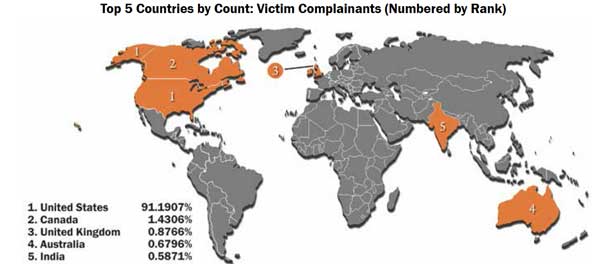WASHINGTON – International – The Federal Bureau of Investigation has released the latest details on Internet based crime. The Internet Crime Complaint Center (IC3) 2012 Internet Crime Report is a summary of reported fraudulent activity, including data and statistics.
In 2012, the IC3 received and processed 289,874 complaints, averaging more than 24,000 complaints per month. Unverified losses reported to IC3 rose 8.3 percent over the previous year.
“The 2012 Internet Crime Report reveals both the volume and the scope of Internet crime, as well as the efforts of IC3 and law enforcement to combat these crimes,” said National White Collar Crime Center Director Don Brackman. “As technology continues to advance, so will our efforts to stay one step ahead of cyber criminals.”
Internet Crime up 8.3%

A new section in this year’s report includes charts for each of the 50 states detailing demographic, complaint, and dollar-loss data. The section allows for easy comparisons and convenient reference. Additional content includes frequently reported Internet crimes, case highlights, and graphs that explain the lifecycle of a complaint. The most common complaints received in 2012 included FBI impersonation e-mail scams, various intimidation crimes, and scams that used computer “scareware” to extort money from Internet users. The report gives detailed information about these and other commonly perpetrated scams in 2012. The IC3 works to educate the public and law enforcement about fraud trends.
Romance Scams
Perpetrators use the promise of love and romance to entice and manipulate online victims. A perpetrator scouts the Internet for victims, often finding them in chat rooms, on dating sites and even within social media networks.
These individuals seduce victims with small gifts, poetry, claims of common interest or the promise of constant companionship. Once the scammers gain the trust of their victims, they request money, ask victims to receive packages and re-ship them overseas or seek other favors.
These cyber criminals capitalize on the vulnerabilities of their victims.This crime not only affects the victims financially, there are emotional and mental implications as well. The IC3 received 4,467 complaints and the victims’ losses totalled more than $55 million.
Richard A. McFeely, executive assistant director of the FBI’s Criminal, Cyber, Response, and Services Branch, said: “Criminals are increasingly migrating their fraudulent activities from the physical world to the Internet. Computer users who suspect or become victims of online fraud schemes—including suspicious e-mails, fraudulent websites and Internet crimes—should report them to the IC3. The IC3 analyzes and makes connections among these reports and packages them for potential action by law enforcement.”
IC3 is a partnership between the Federal Bureau of Investigation (FBI), the National White Collar Crime Center (NW3C), and the Bureau of Justice Assistance (BJA). Since its start in 2000, the IC3 has become a mainstay for victims reporting Internet crime and a way for law enforcement to be notified of such crimes. IC3’s service to the law enforcement community includes federal, state, tribal, local, and international agencies that are combating Internet crime.







